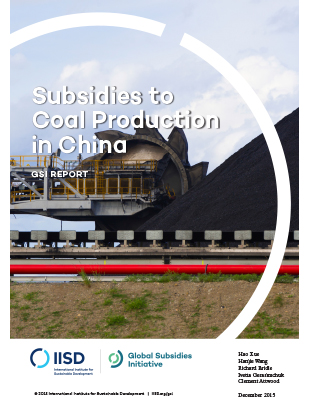
Subsidies to coal production in China
This report presents a bottom-up inventory of subsidies to the Chinese coal industry. It starts with a snapshot of the different methodologies available for subsidy evaluation and then describes the identified

This report presents a bottom-up inventory of subsidies to the Chinese coal industry. It starts with a snapshot of the different methodologies available for subsidy evaluation and then describes the identified

The survey was conducted during the past four weeks by researchers at GlobeScan with the support of the World Bank, the United Nations Environment Program (UNEP), the International Union for Conservation of Nature (IUCN), ICLEI Local Governments for Sustainability and the International Development Research Centre (IDRC), along with other contributing organizations.
The equitable and sustainable allocation and management of water are crucial for maintaining the ecological function of freshwater water ecosystems. These functions sustain the significant services that these ecosystems provide to support human well-being; biodiversity underpins the functioning of these
The links between ecosystem approaches to health, natural resource management and poverty reduction are being identified as important and relevant across an increasing number of disciplines and institutions. However, specific implementation guidance is scant.
Access to safe and affordable water is considered to be a basic human right, yet the universal reality does not reflect this principle. A lack of adequate capacity and financing, and national policies which often rely on unsustainable use of water resources, prevent effective and sustainable provision of safe water and sanitation.
Intellectual property occupies a central position in the biotechnology innovation system, the expected source of new medicines, foods and bio-energy.

This report describes an evaluation framework for identifying optimal (best overall, taking into account all benefits and costs) transportation emission reduction strategies. Current
This paper explores the potential and challenges that would face trade-policy-makers in trying to contribute to climate change objectives by liberalizing trade in low-carbon goods. It draws heavily on the existing talks under the Doha Development Agenda for liberalizing trade in environmental goods and services.

Technological solutions are imperative in meeting the challenges of climate change. A critical factor in greenhouse gas emissions, technology is also fundamental to enhancing existing abilities and lowering the costs of reducing these emissions.
This paper provides guidance for implementing Pay-As-You-Drive (PAYD) vehicle insurance, which directly incorporates mileage as a rate factor. It describes PAYD pricing options, discusses PAYD benefits and costs, describes regulatory reforms, evaluates various objections to PAYD, and provides specific recommendations for PAYD implementation. Various data sources indicate that crash costs increase with annual vehicle mileage. As a result, PAYD increases actuarial accuracy (premiums better reflect a vehicle